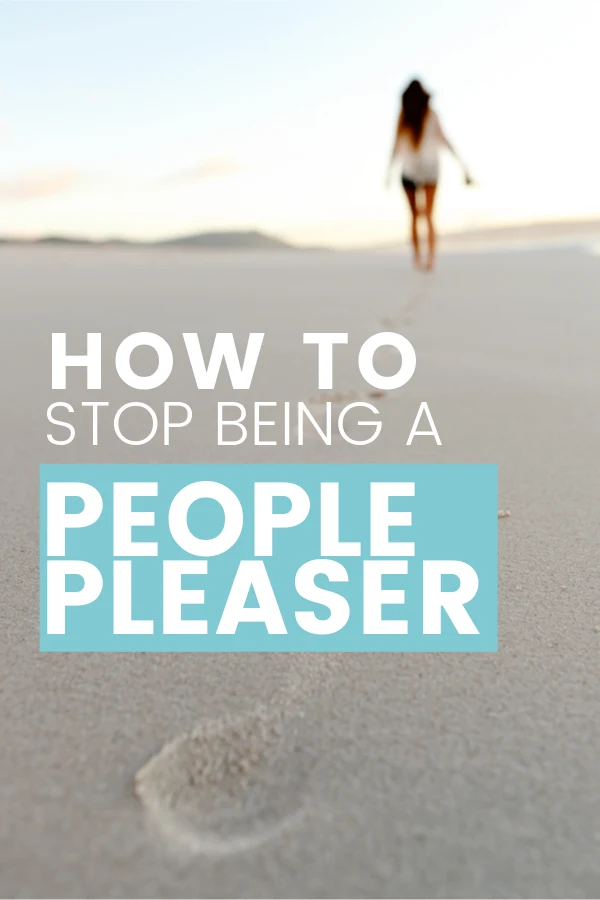Learning how to stop being a people pleaser will completely change your perspective. You'll learn to make yourself a priority, for once.
Kind people can easily get caught in a cycle of tending to others' needs and wants while denying their own. Underneath, lurks feelings of guilt, obligation and duty, and the need to appear nice and kind.
How to Stop Being a People Pleaser
Over time, exhaustion and resentment build. It is possible to learn how to stop being a people pleaser. In the process, one will learn put self first. One must begin by focusing on his or her own needs!

What is People Pleasing?
The people pleaser will say “yes,” when deep down, they want to say “no”. In turn, they will feel guilty when they find the courage to say “no”. Feeling responsible for everyone else — particularly other's problems — is another common experience that people pleasers endure on a regular basis.
Many people pleasers are also empaths, due to their emotional connect to what other's are feeling.
These caring souls are wonderful friends because they do favors, offer support, solve problems, and stand by their loved ones. It isn't until they become so over burdened, focusing on others, that they suffer from burn-out.
Why People Put Others' Needs First?
Compassion is one reason some people put others ahead of themselves. However, when it becomes detrimental to their own physical, mental, emotional, or spiritual health, there are usually additional factors.
Each person is unique and has their own particular psychological makeup, so it is helpful to explore the following questions:

What is the motive?
Underneath behaviors are motives – to feel good, gain appreciation or approval, receive attention, avoid rejection, and so on. Awareness of the underlying motives for focusing excessively on others is the first step to changing the pattern.
Does saying no trigger guilt?
What underlies the guilt? Is it feeling responsible for the other, feeling a sense of owing the other, or feeling undeserving or less than? It is helpful to tune into the underlying messages and question their reality.
Is obligation and duty important?
Many are raised in families that stress the importance of doing what is “right” and societal norms of the day. This may mean attending family events, taking care of others, or being of service to others.
Whenever people take action out of duty and obligation, instead of from their heart, they end up doing more harm than good in the long run. Exploring family and societal beliefs is an important step in breaking free from external conditioning.
How important is it to be nice?
Some people believe they need to be nice all the time; otherwise they feel like they are being mean. This is an “all or nothing” mode of thinking. In reality, it is possible to say “no” without being mean. Likewise, it is possible to put yourself first without harming others.

Learning How to Put Yourself First
If people pleasing means putting others' needs first, then it makes sense that the opposite would be to put yourself second. This is not an easy task for those who easily sense what others' need before even being asked. But with practice, a new balance can be achieved. Try the following:
Check the motivation.
Before tending to others, doing favors, and putting others' first, check in to what is motivating this behavior. If it is not coming from a place of true desire and interest that benefits both parties, rethink it.
Meet underlying needs.
If the need for approval, appreciation, love, or acceptance underlies people pleasing behaviors, find healthier ways to experience these. For example. self-love, self-appreciation, self-approval, and self-acceptance are more fulfilling in the end.
RELATED: 45 Positive Affirmations for Women
Focus on your own needs.
Check in with your mind, body, heart, and soul on a daily basis to discover your needs and how to best meet them.
See others as capable.
If sympathy motivates care-taking behaviors, rise up to a place of compassion where caring for the others' dilemmas is balanced by seeing their resourcefulness. This will lead to allowing others to care for themselves.
Set healthy boundaries.
If friends or family pull at your heart strings as a way to manipulate your behavior, it may be time to set healthy boundaries.
It takes time to find a new balance between caring for others and caring for self, but once it is achieved, resentment drops away and energy returns. For additional tips on how to focus more on self, check out these inspirational books for women!

… [Trackback]
[…] Information to that Topic: butfirstjoy.com/stop-being-a-people-pleaser/ […]
… [Trackback]
[…] Info to that Topic: butfirstjoy.com/stop-being-a-people-pleaser/ […]
… [Trackback]
[…] Find More on that Topic: butfirstjoy.com/stop-being-a-people-pleaser/ […]
… [Trackback]
[…] Find More Information here to that Topic: butfirstjoy.com/stop-being-a-people-pleaser/ […]
… [Trackback]
[…] Read More Information here on that Topic: butfirstjoy.com/stop-being-a-people-pleaser/ […]
… [Trackback]
[…] Find More on that Topic: butfirstjoy.com/stop-being-a-people-pleaser/ […]
… [Trackback]
[…] Find More Information here on that Topic: butfirstjoy.com/stop-being-a-people-pleaser/ […]
… [Trackback]
[…] Find More here to that Topic: butfirstjoy.com/stop-being-a-people-pleaser/ […]
… [Trackback]
[…] Here you will find 61625 additional Info to that Topic: butfirstjoy.com/stop-being-a-people-pleaser/ […]
… [Trackback]
[…] Find More on that Topic: butfirstjoy.com/stop-being-a-people-pleaser/ […]
… [Trackback]
[…] Read More Info here on that Topic: butfirstjoy.com/stop-being-a-people-pleaser/ […]
… [Trackback]
[…] Find More on that Topic: butfirstjoy.com/stop-being-a-people-pleaser/ […]
… [Trackback]
[…] Find More Information here to that Topic: butfirstjoy.com/stop-being-a-people-pleaser/ […]
… [Trackback]
[…] There you can find 5963 more Information on that Topic: butfirstjoy.com/stop-being-a-people-pleaser/ […]
… [Trackback]
[…] Here you will find 81754 additional Info to that Topic: butfirstjoy.com/stop-being-a-people-pleaser/ […]
… [Trackback]
[…] Find More Info here on that Topic: butfirstjoy.com/stop-being-a-people-pleaser/ […]
… [Trackback]
[…] Find More on that Topic: butfirstjoy.com/stop-being-a-people-pleaser/ […]
… [Trackback]
[…] Find More to that Topic: butfirstjoy.com/stop-being-a-people-pleaser/ […]
… [Trackback]
[…] Read More on that Topic: butfirstjoy.com/stop-being-a-people-pleaser/ […]
… [Trackback]
[…] Find More on that Topic: butfirstjoy.com/stop-being-a-people-pleaser/ […]
… [Trackback]
[…] Info to that Topic: butfirstjoy.com/stop-being-a-people-pleaser/ […]
… [Trackback]
[…] Read More to that Topic: butfirstjoy.com/stop-being-a-people-pleaser/ […]
… [Trackback]
[…] Here you can find 62921 additional Information to that Topic: butfirstjoy.com/stop-being-a-people-pleaser/ […]
… [Trackback]
[…] Find More on that Topic: butfirstjoy.com/stop-being-a-people-pleaser/ […]
… [Trackback]
[…] Information to that Topic: butfirstjoy.com/stop-being-a-people-pleaser/ […]
… [Trackback]
[…] Read More on on that Topic: butfirstjoy.com/stop-being-a-people-pleaser/ […]
… [Trackback]
[…] Info on that Topic: butfirstjoy.com/stop-being-a-people-pleaser/ […]
… [Trackback]
[…] Information to that Topic: butfirstjoy.com/stop-being-a-people-pleaser/ […]
[…] you go above and beyond for others and put their immediate needs before yours, it can quickly become emotionally […]
[…] If you have trouble with this, use my guide on How To Stop Being a People Pleaser. […]
[…] Stop being a people pleaser. […]
[…] you go above and beyond for others and put their immediate needs before yours, it can quickly become emotionally […]